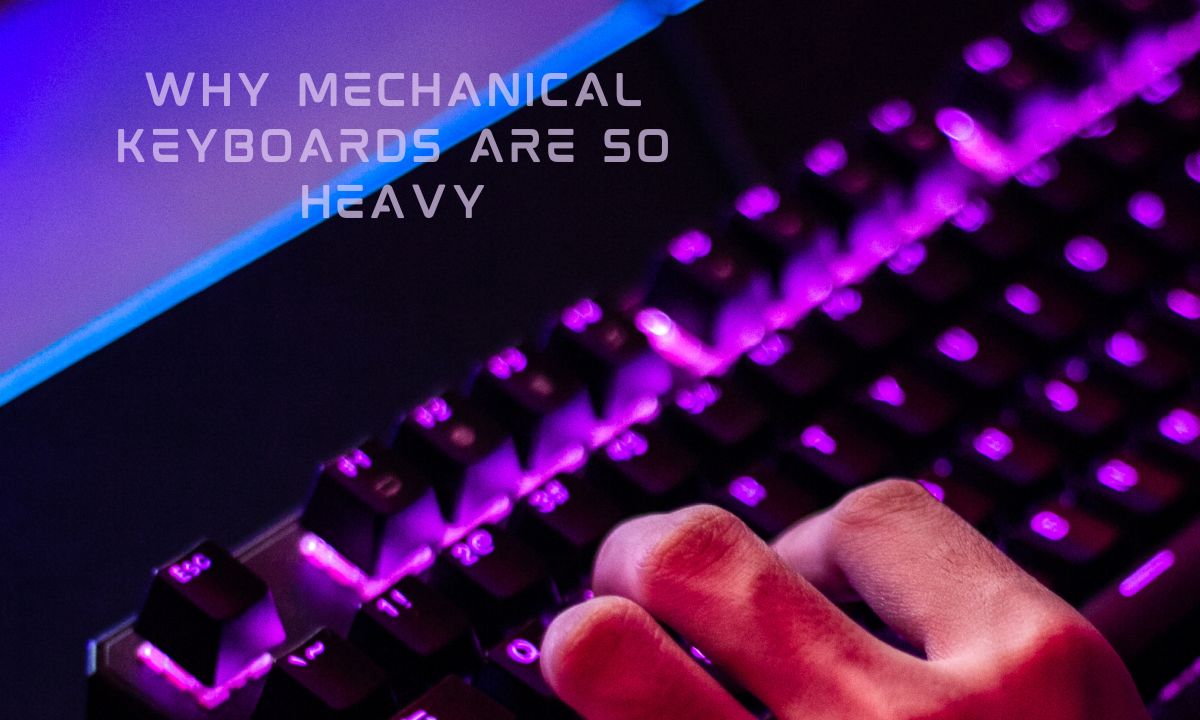9 Reasons Why Mechanical Keyboards Are So Heavy
Mechanical keyboards, highly sought-after for their robust performance, superior tactile feedback, and longevity, have an easily recognizable trait – their weight. If you have ever wondered why these keyboards are…
Mechanical keyboards, highly sought-after for their robust performance, superior tactile feedback, and longevity, have an easily recognizable trait – their weight. If you have ever wondered why these keyboards are noticeably heavier than their membrane counterparts, here are nine compelling reasons.
1. Build Material
High-Quality Materials
Mechanical keyboards are made with high-quality, durable materials. The cases are often made of metal or thick plastic, which significantly contributes to their weight.
Keycap Material
The keycaps are usually made of durable materials like PBT (Polybutylene Terephthalate) or ABS (Acrylonitrile Butadiene Styrene), which are denser and heavier than the materials used in standard keyboards.
2. Mechanical Switches
Presence of Mechanical Components
The presence of individual mechanical switches beneath each key is one of the main reasons for the hefty weight of mechanical keyboards. These switches, made of plastic, metal, and sometimes even rubber, add bulk and weight.
Variety of Switches
Some mechanical keyboards allow switch customization, and certain switches, like tactile or clicky switches, have more components, thus weighing more.
3. Plate Mounted Design
Sturdiness
In most mechanical keyboards, the switches are mounted on a metal plate for added sturdiness. This plate, usually made of steel or aluminum, contributes significantly to the overall weight.
Enhanced Durability
The plate-mounted design also increases the keyboard’s durability and lifespan, making it resistant to everyday wear and tear.
4. Keyboard Size
Full-sized Layout
Many mechanical keyboards feature a full-sized layout, including the number pad. The additional keys and larger frame naturally increase the keyboard’s weight.
Keycap Height
Mechanical keyboards often have high-profile keycaps, which are bulkier and heavier than the low-profile keycaps found on many standard keyboards.
5. Built-in Functions
Additional Features
Some mechanical keyboards come equipped with extra features like programmable keys, media controls, or volume wheels. These additional components add to the keyboard’s overall weight.
Onboard Memory
Keyboards with onboard memory for storing custom settings and profiles also tend to be heavier due to the added hardware.
6. Sound Dampening
Sound Dampening Materials
Mechanical keyboards can be noisy. To reduce the sound, manufacturers often include sound-dampening materials inside the keyboard case, which can add extra weight.
Heavy Backplate
Some models feature a heavy backplate to lower the pitch of the typing sound, which makes the keyboard feel more solid and reduces noise.
Also see:- Das Keyboard 4 Professional Mechanical Keyboard
7. Backlighting and RGB
LED Components
Mechanical keyboards often feature LED backlighting or full RGB lighting. These lighting components, including the LED chips and circuits, add to the overall weight of the keyboard.
Diffuser Materials
To evenly distribute the light, manufacturers use light diffuser materials which also add some extra weight.
8. Key Stabilizers
Stabilizers for Larger Keys
Larger keys, such as the space bar and shift keys, have stabilizers to ensure they press down evenly. These metal or plastic stabilizers add additional weight to the keyboard.
Durability and Balance
Stabilizers also contribute to the keyboard’s durability and balance, ensuring a comfortable typing experience.
9. Quality and Performance Perception
Weight as a Quality Indicator
Finally, the weight of a keyboard often unconsciously signals quality and durability to users. A heavier keyboard feels more robust and stable, which can improve the typing experience.
Non-slip Usage
The added weight also prevents the keyboard from moving or sliding around on the desk during intensive typing or gaming sessions.
In conclusion, the weight of mechanical keyboards is not a design flaw but a feature. It’s a reflection of the quality, durability, and user-centered design that make these keyboards a preferred choice for many professionals and gaming enthusiasts. The heftiness of mechanical keyboards underscores their reliability, ensuring a stable, comfortable, and satisfying typing experience.


